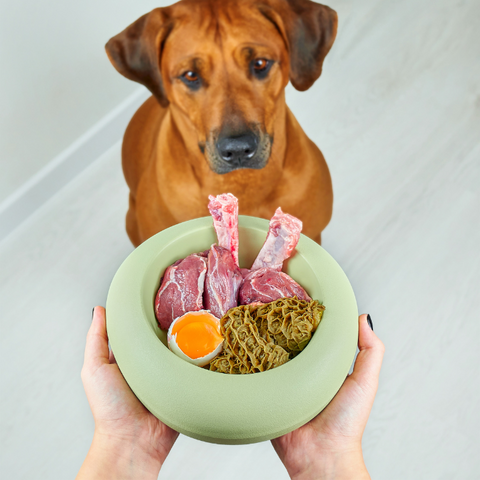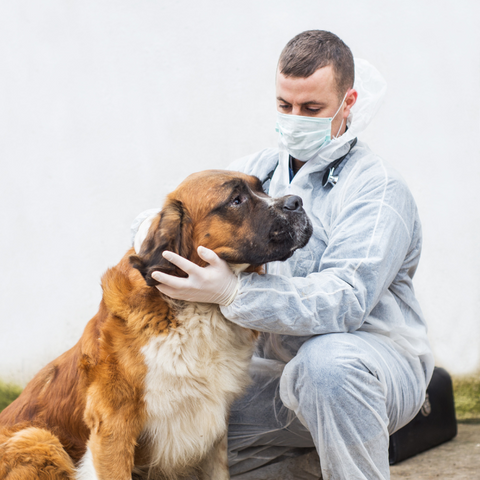Is your dog suddenly itching, scratching, and paw-chewing? These are the most common symptoms of allergies to chicken in dogs. Dogs, just like humans, can have seasonal allergies and allergies or sensitivities to food. Although food allergies are much less common than other types of allergies in dogs, pups affected by food allergies can experience uncomfortable symptoms like skin rashes or digestive upset that affect their quality of life.
Just like human beings, it’s possible for dogs to be allergic to just about anything in their environment or any ingredient in their food. And have an allergic reaction as a result! So, yes, it’s possible for a dog to be allergic to chicken. So, how do you know if your pup has allergies—or more specifically, if your dog is allergic to chicken, a common dog food ingredient? And what can be done about it? We've got answers.
Chicken in a Dog’s Diet

If the main protein component of your dog’s food is chicken protein, you may have found your culprit if they are experiencing allergies. Chicken allergy is the second most common food allergy in dogs after beef, and as much as 15% of dogs suffer from it, according to BMC Veterinary Research.
If the allergy symptoms are new, and symptoms occur after you’ve changed your pet’s food type or brand recently, it’s most likely the problem. However, dogs can also develop a chicken allergy through exposure, which means the more you feed your pet chicken, the more likely he is to become allergic to it. This intolerance means you have to keep an eye on how your dog responds to different food and alternative protein sources. It’s also worth noting that if your dog has a chicken protein allergy, it doesn’t automatically mean that they are allergic to turkey or duck – an allergy to all poultry is very uncommon.
Chicken is the go-to protein of the dog food world. There’s no denying that dogs love the taste of chicken, and it’s also convenient that it’s a lean protein source that’s cheap compared to lamb or beef. This makes chicken an affordable and viable protein source for dogs, and as a result, most dog food and treats feature chicken as their main ingredient. While chicken is a worthy protein source, if your dog doesn’t respond well to it, it’s not the right choice for them.
What Causes Allergies to Chicken in Dogs?

Allergies are an inappropriate overreaction of the dog's immune system. So, if there is a chicken allergy at play, their body treats the chicken protein (allergen) as if it were a threat — as if it were an invading viral or bacterial infection. This immune system’s attack results in inflammation as collateral damage. As described above, these inflammatory effects commonly show up on a dog’s skin or present as digestive issues.
Allergies tend to have a genetic or inherited basis, and as such they are difficult to avoid. Some breeds (Bulldogs, Chinese Shar-Peis, Retrievers, Terriers, Shih Tzus, and Lhasa Apsos) are more commonly affected, although any breed can develop allergies. The most common causes of allergy symptoms in dogs are environmental/seasonal allergies (pollen, etc.) and flea-bite allergies. Food allergies certainly do occur, but they are much less common than many pet parents believe them to be.
Experts report that food allergies account for merely 10% of allergies for dogs. The most common causes of food allergies in dogs are proteins found in beef, lamb, chicken, soy, egg, dairy, or wheat. Sometimes, pups don’t have a true food allergy despite having digestive symptoms. They may just have a food sensitivity or intolerance, meaning they have difficulty digesting one or more ingredients but the immune system is not involved. They may even have a weakened immune system. Whether a dog has a true food allergy or a food intolerance, it’s beneficial to figure out which ingredient(s) they are sensitive to and then to find dog food that works well for their body.
So, Is Your Dog Allergic to Chicken?

You may be wondering: “Is my dog allergic to chicken, and if so, what caused it?”. In most instances, dogs develop an allergy to chicken over time from exposure. It could also have something to do with their genetics. Several other factors may be at play, such as the environment. If your dog has shown different food sensitivities before, there’s a possibility that he is at risk of a chicken allergy too.
Scientific researchers interested in the world of dogs are hard at work investigating possible causes for the dog immune system to express an allergy. While some information is out there, more clarity is needed. There is proof that breeders using the same breeding dogs with chicken intolerance are likely to spread the allergy.
What Does Chicken Allergy in Dogs Look Like?
So, what exactly are the symptoms of a chicken allergy in dogs? Well, for the most part, it’s a lot of itching and scratching, but there’s more to the chicken allergy than that. In fact, the symptoms can be quite concerning and, if left untreated, can become severe. And how can you tell if your dog is allergic to chicken? This question isn’t the most straightforward one to answer, as there’s always a risk of assigning blame to food when there may be another issue at play. Of course, one should never assume when it comes to chicken intolerance in dogs, but there are tell-tale signs.
Symptoms of Chicken Allergies in dogs
First, familiarize yourself with the common signs of chicken food allergies in dogs before assuming that it’s the food causing discomfort. If you have a dog allergic to chicken, symptoms may present as follows:
- Your dog suddenly starts to itch and scratch, especially around their face – this impacts the ears and mouth areas most commonly. Itchy skin is one of the most common symptoms of a dog allergy.
- Your dog has developed a rash or has inflamed skin.
- There are increased occurrences of floor-scooting or licking the rear area.
- Your dog starts licking or chewing their paws constantly.
- You notice hair loss or bleeding skin in some areas. Often the hair loss is attributed to rubbing the itchy spot on furniture or carpets.
- Your dog is showing signs of bloating and gassiness.
- You notice that your dog suddenly has diarrhea or is vomiting after mealtimes.
A way to get to the bottom of it quickly is to pay the cost of an allergy test at your veterinarian’s office. The allergy test is the fastest but also the costliest route.
Diagnosing A Dog Chicken Allergy

Discovering a chicken allergy in dogs (or any food allergy) involves going through a process of elimination, which requires patience. But it can lead to the best possible treatment option for your pup by getting an answer as quickly as possible. If you notice symptoms of a poultry allergy in your dog, it’s best to schedule a veterinary visit. After that, the process commonly follows these steps…
- Your vet will take a history on your dog, meaning they will ask you questions about your dog’s symptoms, their diet, and anything they could have been exposed to. They’ll also do a full physical exam.
- Other causes of your pup’s symptoms must be ruled out. A common first step is an ear swab or light skin scrape to look for bacteria, yeast, and microscopic parasites. If your vet suspects an underlying medical issue (such as a hormonal imbalance) they may also recommend diagnostics such as blood tests.
- If your pup’s symptoms persist or an allergic reaction, an allergy workup may be recommended.
- An allergy workup usually starts with a food trial, also known as an elimination diet. This means a strict diet on a new type of dog food for 1-3 months. Your vet team can explain this process in detail, including how to select an appropriate food and acceptable treat substitutes. Keeping a food diary during this time is also recommended.
- If a dog shows significant improvement on a food trial, they may continue the new food long-term. Your vet can explain how to gradually add in other items (such as treats) to see if they trigger symptoms. This process can help determine which foods a dog can or cannot tolerate.
- If a pup does not improve on a food trial, the next step is to evaluate for environmental allergies. Usually, this is done via a blood test that is sent to a laboratory for analysis. While blood tests are not accurate for food allergies, they can be very helpful for determining which environmental allergens a pooch is sensitive to.
What is the Most Effective Way to Treat A Dog Chicken Allergy?
If your dog is showing an allergic response or signs of an allergy to chicken, you’re right to be concerned. You may wonder what your treatment options are and the good news is that with the right treatment plan, everything will be just fine. The most effective way to ensure your dog’s comfort is to eliminate the offending food source from their diet immediately. You can transition your dog back onto their previous diet, but if there’s a valid reason for the food change to start with, this may not be an option for you.
It stands to reason that your vet should be the very first person you consult. They will be able to determine if your dog’s reaction is indeed related to a chicken allergy or not. In most instances, the vet will recommend a special diet or limited ingredient food that doesn’t contain chicken. Once your dog’s allergy has cleared, you can try reintroducing your dog to chicken-based foods to see if the cause was the chicken after all.
Alternative Food Options For Dogs With Chicken Allergies

A protein source that is very different from chicken (such as beef or a less common protein like rabbit or venison) is usually a good bet for a food trial. However, it’s important to check ingredients carefully, as many dog food options contain chicken meat, organs, or broth, even if it’s not a primary ingredient. Also, even commercial dog foods that don’t contain chicken as an ingredient may get contaminated if they are processed in a facility that also manufactures chicken-based dog foods.
For all these reasons, many vets recommend using a prescription allergy food in your dog's diet. These diets contain either a novel source protein (like rabbit or venison), or a ‘hydrolyzed’ protein (one that is processed in a way that the body is less likely to recognize it as an allergen). For prescription allergy dog foods, the facility will demonstrate excellent quality control, even shutting down and thoroughly cleaning the equipment to prevent cross contamination. Because of this, prescription diets are usually a great choice as a first step, to get the most accurate results from a food trial for allergies.
Conclusion
While the symptoms of a chicken allergy in dogs are relatively easy to pick up on, it’s important to note that your dog could be allergic to something else in the food. Other possible allergens include milk, soy, beef, eggs, corn, or wheat. All of these ingredients are commonly included in dog foods. It’s essential to chat with your vet about allergy testing or to gather further health-related advice.
Frequently Asked Questions
Here are the most common questions pet parents ask about chicken allergy in dogs. Perhaps they can help you too.
What are the tell-tale signs and allergy symptoms of a chicken allergy in dogs?
Itching, scratching, paw licking/chewing, carpet-scooting, and rear-end licking.
How common is an allergic reaction to chicken in dogs?
A chicken allergy is more common in dogs than most people think. 15% of dogs suffer from the allergy.
Can chicken cause diarrhea in dogs?
If your dog has diarrhea after eating chicken, you may worry that chicken is the culprit. The short answer is that, yes, chicken can cause diarrhea in dogs. It's an allergic response. This is especially true if the dog has an allergy to chicken or if the chicken is undercooked when fed to the dog. If your dog has an adverse effect every time you feed him chicken, you should remove chicken from their diet and speak with your vet about possible treatment options.
If a dog is allergic to chicken, will it also be allergic to turkey?
While it is possible that your dog can also be allergic to other forms of poultry, it is actually very rare.


